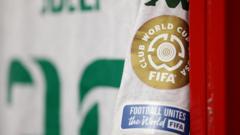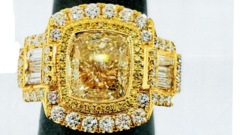Is FIFA Failing in the Fight Against Racism?

FIFA's Football Unites the World Campaign: A Step Back in Anti-Racism Messaging?
As the FIFA Club World Cup unfolds, the spotlight is not only on the participating teams but also on FIFA's promotion of its "Football Unites the World" campaign. While the intention behind this slogan is to foster a sense of global unity through football, it has come under fire for overshadowing essential anti-racism messaging that had previously been a hallmark of FIFA's initiatives. Critics argue that this shift may be influenced by the political climate in the United States, particularly under the administration of former President Donald Trump, who has rolled back several diversity and inclusion programs.
The Shift in Messaging
In stark contrast to FIFA's stance during the Qatar 2022 World Cup, where "no discrimination" armbands were prominent, the current campaign appears to sidestep explicit anti-racism messaging. This decision has not gone unnoticed, with campaigners expressing disappointment and concern about the implications it may have for the message of inclusion in football.
Previous Commitment to Anti-Racism
FIFA has made strides in recent years to combat racism and promote diversity. The organization's revised disciplinary code aimed to address racist incidents more effectively and was supported by various stakeholders in the football community. Some of the notable measures introduced include:
- Increased minimum bans for players and officials involved in racist incidents.
- Enhanced financial penalties for clubs and organizations failing to address racism.
- A three-step anti-discrimination protocol empowering referees to act decisively during matches.
This progressive approach had been welcomed, suggesting a commitment to fostering a more inclusive environment in football. However, the lack of such messaging at the Club World Cup raises questions about FIFA's consistency in promoting these values on a global stage.
Concerns from Advocacy Groups
Organizations focused on fighting discrimination in sports, such as Fare and Kick It Out, have voiced their concerns regarding FIFA's apparent shift. Piara Powar, executive director of Fare, expressed disappointment that anti-discrimination messaging was absent during the tournament, emphasizing that such messaging has historically resonated well with fans and players alike. He articulated the importance of broadcasting a message of inclusion to a global audience, especially during high-profile events like the Club World Cup.
The Political Climate and Its Influence
The political landscape in the United States, particularly under Trump's administration, has been characterized by significant changes in policies related to diversity and inclusion. The federal government's direction to dismantle diversity, equity, and inclusion (DEI) programs has prompted several corporations and organizations to rethink their own initiatives. As FIFA operates within this environment, some critics speculate that the organization may be treading carefully to avoid political backlash.
Evan Whitfield, chair of the Human Rights Soccer Alliance (HRSA), underscored the necessity for FIFA to maintain consistent values regardless of the host country's political climate. He noted that a basic message like "football unites the world" lacks the specificity needed to confront systemic issues like racism effectively. Whitfield's statement reflects a broader sentiment that football is a universal language, and its governing body should champion anti-discrimination principles consistently across all competitions.
The Role of Football in Social Change
Football has always held a unique position in society—not just as a sport, but as a powerful catalyst for social change. The sport's vast reach allows it to transcend cultural, racial, and geographic barriers, making it an ideal platform for promoting messages of unity, diversity, and inclusion. The recent actions of teams and players further illustrate this potential.
Examples of Activism in Football
Recent events in the football world have showcased how teams and players are using their platforms to advocate for social justice. For instance, during a National Women's Soccer League match, Angel City FC made headlines by wearing shirts bearing the message "Immigrant City Football Club." This act was a powerful response to ongoing immigration raids by ICE and highlighted the team's commitment to solidarity with marginalized communities.
Such initiatives show that, even if FIFA's messaging may falter, grassroots movements within football are actively working to address social issues. The visibility of these efforts is crucial, as they reinforce the idea that football can be a unifying force while also promoting awareness of pressing social concerns.
The Future of FIFA's Anti-Discrimination Efforts
Despite the criticisms surrounding the Club World Cup's messaging, FIFA has reiterated its commitment to fighting discrimination. A spokesperson stated that while "Football Unites the World" is the main global campaign, further activities to reinforce FIFA's stance on anti-discrimination will be implemented in due course. This assurance raises questions about how these initiatives will manifest in future competitions, including the upcoming World Cup.
As FIFA navigates the balance between promoting unity and addressing discrimination, it must also consider the expectations of stakeholders across the globe. The organization has an opportunity to lead by example, showcasing that football can unite communities while firmly standing against racism and discrimination.
Conclusion: A Call for Consistency and Action
The debate surrounding FIFA's messaging at the Club World Cup underscores the importance of maintaining consistent values in the fight against discrimination. As a global governing body, FIFA has the responsibility to champion diversity and inclusion, not just in words but also in action. The football community—players, fans, and organizations alike—must hold FIFA accountable to ensure that the sport continues to be a platform for positive change.
As we reflect on the importance of football in promoting social justice, one must consider whether FIFA's current approach will evolve to meet the needs of a diverse global audience. Will the organization return to its previously strong anti-discrimination messaging, or will the focus on unity overshadow the pressing need for inclusivity? Only time will tell, but the conversation must continue.
FAQs
What is the Football Unites the World campaign?
The Football Unites the World campaign is FIFA's main global initiative aimed at promoting unity and inclusivity through football. It is displayed in stadiums and on social media platforms during major tournaments.
Why are campaigners concerned about the lack of anti-racism messaging?
Campaigners are concerned that the absence of anti-racism messaging at the Club World Cup may weaken the fight against discrimination and send a message that such issues are less important, especially in a politically sensitive environment.
How has FIFA addressed racism in the past?
FIFA has introduced a revised disciplinary code that includes increased penalties for racist behavior, a three-step anti-discrimination protocol for referees, and various initiatives aimed at promoting diversity and inclusion.
As we examine the complexities of FIFA's messaging, it is essential to remember that football has the potential to inspire change. How can we ensure that the sport remains a champion for inclusion and diversity? #FootballForAll #EndRacism #FIFAMessaging
Published: 2025-06-17 20:03:16 | Category: sport



